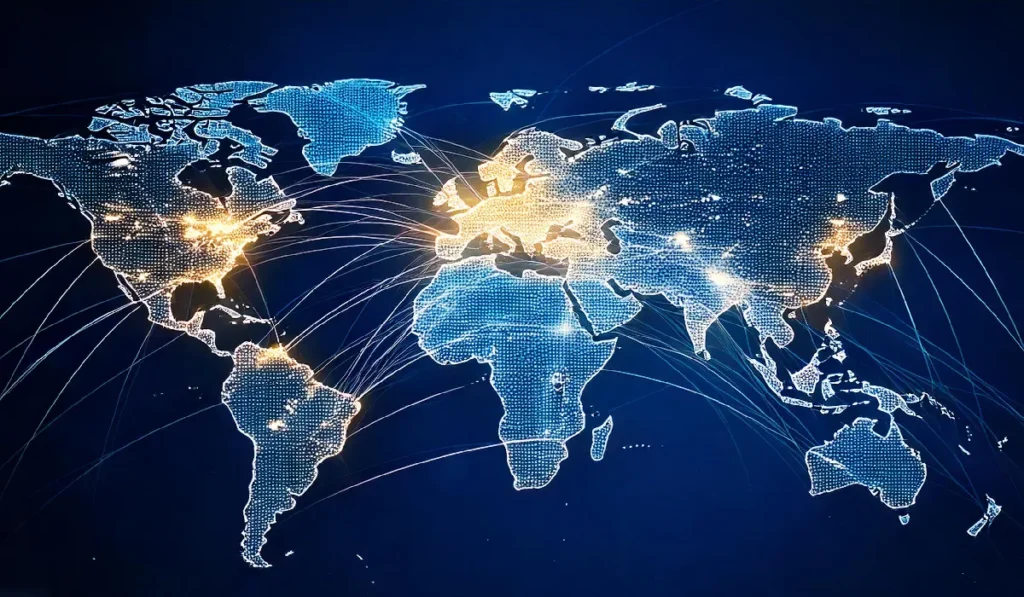
Globalization refers to the expansion of relationships of all kinds beyond national borders not only to a limited area, but to the entire globe. The term is very much related to the economy, but this is not correct, as it encompasses all areas of public and private life, i.e. politics, culture and the environment and, above all, communication.
However, globalization was accelerated enormously when, along with a steadily increasing almost explosive world population, more and more countries that had not previously been involved in global trade were integrated.
The more than dynamic reduction of marginal costs in trade resulted in an enormous acceleration of this international integration process, which freed many countries from abject poverty (such as China and others) and at the same time promoted global prosperity. Of course, such a development could not be without disadvantages. (Marginal cost is the cost of a single unit in the event of a quantitative increase, so that the cost per unit can usually be reduced per additional unit for a higher quantity.)
The reduction in transaction costs in national and international exchanges accelerated development, especially in the following key areas:
- Exchange of news, knowledge and ideas (e.g. Internet, e-mails, etc.)
- Transaction costs of goods (e.g. freight cost reduction through containerization) while at the same time lowering the unit cost limit in mass production through division of labor in other countries
- Financial transactions, money (networked banks, SWIFT, etc.), transaction costs for transfers and currency exchange were increasingly carried out digitally in seconds
- People, e.g. transport costs fell more and more, mass tourism became possible, workers became mobile worldwide, etc.
However, the form of globalization and the cost reduction through the international division of labor as well as the outsourcing of production was incomplete, as it did not price in the quality of business relationships from the previous quantitative models.
Today’s problems in the world can only be solved globally. Therefore, the previous, incomplete and one-sided globalization must be significantly expanded, especially regarding the “quality” of relationships. To this end, there must be a globalization of various qualities, which favors democratic states, for example. These qualitative factors can also be quantitatively assessed and calculated as a risk.
We therefore need not less, but much more globalization!
- The moral hazard described earlier in the opposing attitudes is now becoming abundantly clear.
- The “corruption of advantage”, which resulted from cheap flows of goods, including raw materials such as gas, oil, rare earths, etc., especially from China and Russia, paralyzed the will to perceive: people looked the other way even in the case of appalling human rights violations.
- The costs for the moral hazard – as well as derived from it – the ruthless destruction of the environment and e.g. the social dumping etc…. are high costs, but they are not priced into the trade.
- The supposedly superior ability to translate costs in the exchange of services into correct price determination, which has so far been attributed to capitalism, must be expanded, since the economic costs of production in terms of their environmental harmfulness have been outsourced to the global economies without recalculation at the economic level.
- Now we are coming up against massive limits, which, as environmental damage and disasters, are causing considerable movement to the limits of the habitability of entire areas and the use of nature for example in agriculture.
- The previously hidden costs are now becoming clearer and clearer and must be transferred into international relationship structures that calculate these costs back.
- Approaches to this have already been found in CO2 pricing and
- a possible climate club that imposes the standards on its members and adds customs surcharges to the club’s “foreign trade”. Such a “club” would urgently have to include the other topics shown here.
Without globalization, we can no longer solve today’s problems. A radical decoupling is just as naïve and unrealistic as carrying on as before. It is essential to change the goals and orientation and to avoid shocks that would only hinder the ability to reform. But democracies have to be aware of that China itself is pushing forward decoupling in many areas from democracies.
The return to the nature of the human being described here and the mature attitude of economic activity that can be derived from it must be expanded globally, since the opportunity costs of pubertal selfishness rise exponentially faster than any benefit that can be derived from it. This results in the indispensable promotion of liberal societies and the massive pushing back of totalitarian autocracies and their anxiety-based power systems, which are usually associated with considerable state crime and as in the case of China and above all Russia progress through espionage, corruption of all kinds, cyber attacks, influencing elections and politics and even contract killings as well as the establishment of harmful criminal structures themselves. Continuing to “look the other way” against good profits cannot be the way, as they are poisoned profits that do far more harm than good.
The actual costs of the products must finally be calculated and adjusted correctly, so that the costs (e.g. environmental pollution) that have so far been outsourced to the global economy without recalculation as well as qualitative factors are quantitatively recalculated into the business costs of the companies. Likewise, the qualitative factors of a business relationship will have to be evaluated quantitatively. The major Western economies are increasingly able to enforce this through their market power through individualized tariffs and norms, instead of continuing to be part of a criminal tendency. To uncover these has so far lacked the will to perceive, but this criminal tendency is now very openly evident in the implementation, and it is hardly possible to look away comfortably.
The economic theory of the neoliberal and neoclassical construct of a market participant who pursues only and exclusively his egoism, which is still widely accepted today, ignores all other aspects in the relationship between justice, nature and power.
Every theory is a simplification of reality and the resolution of economic processes into mathematical formal quantifiability and their processing in computer models had and still has great advantages.
However, this has nourished the belief that the “market of egoisms” reflects the correct total costs in the price, including the entrepreneur’s wage, in production.
The limitation and concentration on the quantifiability of exclusively selfishly acting economic agents had ignored the qualitative factors. This became even more problematic when the predominantly nationally organized markets were increasingly opened up in globalization in the middle of the last century in order to leverage the so-called comparative cost advantages in the same quantitative view. The integration of large economies into an emerging global economy initially brought great benefits and progress to the world for many market participants.
Quantifying globalization as a risk without the central questions of human existence in the exchange of ideas and political systems is an immense mistake in every respect, which now also leads to very large economic losses and setbacks.
Henry Kissinger had made an enormous mistake in his thinking when he coined the essential sentence that states have no friends, only interests. In doing so, he ignores the quality of relations in economic exchange, which has led us to today’s risks of a world war that has already begun.
Now they are regulating with sanctions and other measures, which is much more expensive than building up the structures properly right away.
Likewise, the subsequent regulation of global environmental pollution, which endangers the continued existence of humanity through greenhouse gases and the massive global warming of the planet, is an increasingly expensive measure if decisive and, above all, internationally coordinated action is further delayed.
It will now be very important for the democracies of this world to form an exclusive club in world trade, which sets itself apart in a differentiated way, at least from the very aggressive autocracies and no longer grants them the privileged position they have had so far.
This is the only way to contain the Third World War, which has already fully begun, although of course all other measures, such as massive support for Ukraine with weapons, make it necessary until complete victory. A complete victory, of course, means the recapture of the original territory of Ukraine, and not the defeat of Russia, which is complete nonsense and was falsely claimed by Trump for understandable electoral reasons.
It is unclear to what extent the war for resources already plays an additional role in the plans of Russia and China in the global conflict. What is clear, however, is that China accurately calculates the dependencies that have been created and already achieved worldwide and now instrumentalizes them strategically, as could be seen in the example of the Baltic states.
It was also announced from China that the economies of China and Russia complement each other in an ideal way. If the incorporation of Ukraine’s agricultural and other resources is added to this, the potential for blackmail and damage will grow even further.
The bundling of agricultural production in Russia and Ukraine would be another dominant world market position, from which Russia and China could create existence-threatening market distortions for American farmers in their dependence on the world market and put the European market under stress.
Biden and Harris have already expressed such nuanced considerations, whereas Trump, in continued ignorant arrogance, persists in the idea that America can decouple and assert itself on its own, rather than forming “strong alliances,” as Harris put it.

